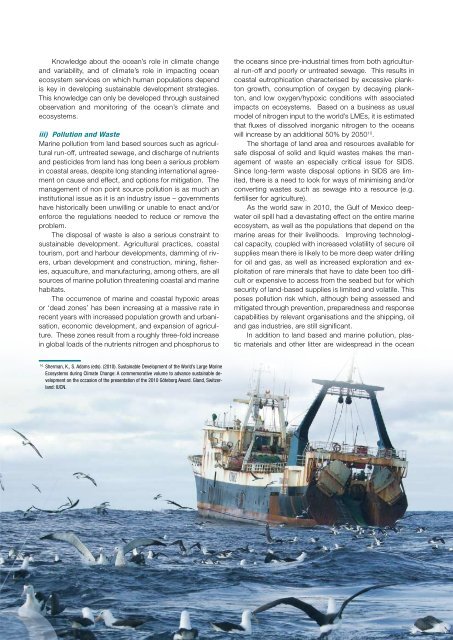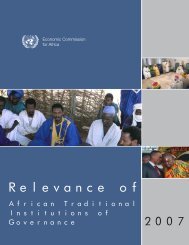Download Publication - Rio+20
Download Publication - Rio+20
Download Publication - Rio+20
Create successful ePaper yourself
Turn your PDF publications into a flip-book with our unique Google optimized e-Paper software.
Knowledge about the ocean’s role in climate change<br />
and variability, and of climate’s role in impacting ocean<br />
ecosystem services on which human populations depend<br />
is key in developing sustainable development strategies.<br />
This knowledge can only be developed through sustained<br />
observation and monitoring of the ocean’s climate and<br />
ecosystems.<br />
iii) Pollution and Waste<br />
Marine pollution from land based sources such as agricultural<br />
run-off, untreated sewage, and discharge of nutrients<br />
and pesticides from land has long been a serious problem<br />
in coastal areas, despite long standing international agreement<br />
on cause and effect, and options for mitigation. The<br />
management of non point source pollution is as much an<br />
institutional issue as it is an industry issue – governments<br />
have historically been unwilling or unable to enact and/or<br />
enforce the regulations needed to reduce or remove the<br />
problem.<br />
The disposal of waste is also a serious constraint to<br />
sustainable development. Agricultural practices, coastal<br />
tourism, port and harbour developments, damming of rivers,<br />
urban development and construction, mining, fisheries,<br />
aquaculture, and manufacturing, among others, are all<br />
sources of marine pollution threatening coastal and marine<br />
habitats.<br />
The occurrence of marine and coastal hypoxic areas<br />
or ‘dead zones’ has been increasing at a massive rate in<br />
recent years with increased population growth and urbanisation,<br />
economic development, and expansion of agriculture.<br />
These zones result from a roughly three-fold increase<br />
in global loads of the nutrients nitrogen and phosphorus to<br />
the oceans since pre-industrial times from both agricultural<br />
run-off and poorly or untreated sewage. This results in<br />
coastal eutrophication characterised by excessive plankton<br />
growth, consumption of oxygen by decaying plankton,<br />
and low oxygen/hypoxic conditions with associated<br />
impacts on ecosystems. Based on a business as usual<br />
model of nitrogen input to the world’s LMEs, it is estimated<br />
that fluxes of dissolved inorganic nitrogen to the oceans<br />
will increase by an additional 50% by 2050 10 .<br />
The shortage of land area and resources available for<br />
safe disposal of solid and liquid wastes makes the management<br />
of waste an especially critical issue for SIDS.<br />
Since long-term waste disposal options in SIDS are limited,<br />
there is a need to look for ways of minimising and/or<br />
converting wastes such as sewage into a resource (e.g.<br />
fertiliser for agriculture).<br />
As the world saw in 2010, the Gulf of Mexico deepwater<br />
oil spill had a devastating effect on the entire marine<br />
ecosystem, as well as the populations that depend on the<br />
marine areas for their livelihoods. Improving technological<br />
capacity, coupled with increased volatility of secure oil<br />
supplies mean there is likely to be more deep water drilling<br />
for oil and gas, as well as increased exploration and exploitation<br />
of rare minerals that have to date been too difficult<br />
or expensive to access from the seabed but for which<br />
security of land-based supplies is limited and volatile. This<br />
poses pollution risk which, although being assessed and<br />
mitigated through prevention, preparedness and response<br />
capabilities by relevant organisations and the shipping, oil<br />
and gas industries, are still significant.<br />
In addition to land based and marine pollution, plastic<br />
materials and other litter are widespread in the ocean<br />
10.<br />
Sherman, K., S. Adams (eds). (2010). Sustainable Development of the World’s Large Marine<br />
Ecosystems during Climate Change: A commemorative volume to advance sustainable development<br />
on the occasion of the presentation of the 2010 Göteborg Award. Gland, Switzerland:<br />
IUCN.<br />
A BLUEPRINT FOR OCEAN AND COASTAL SUSTAINABILITY 13
















